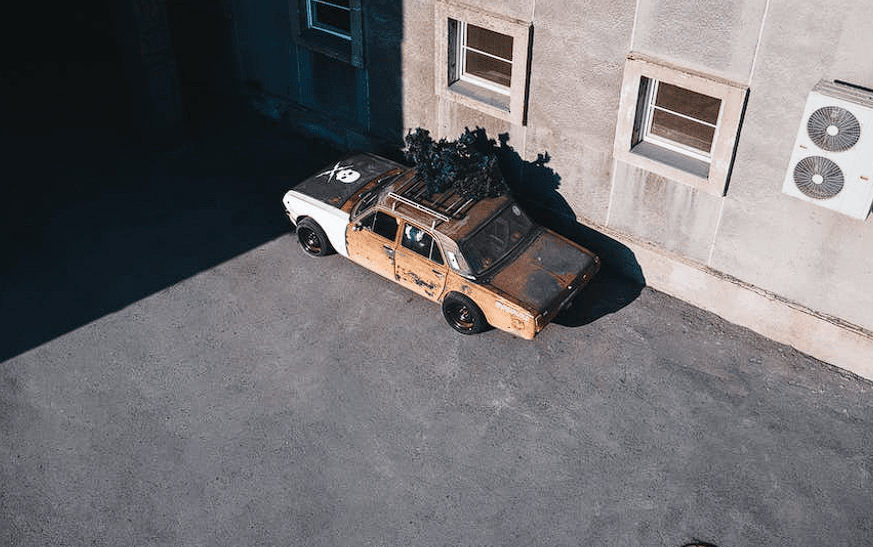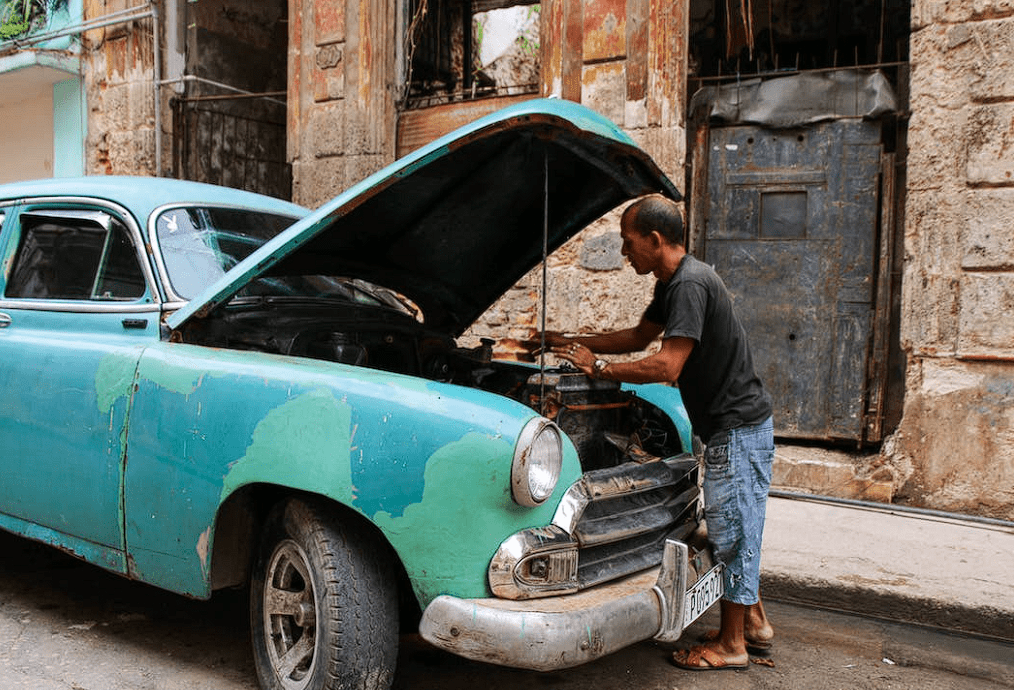There are many potential dangers associated with driving a junk car, and while doing so may appear to be a smart approach to save money in the short term, the decision to buy or drive one should be carefully thought out to avoid any regrets later on.
In addition, some junk vehicles may need extensive work to get back on the road safely, while others may have more serious problems that would render them unsafe even if repaired. Dispose of your car responsibly and safely with Old Cars Removed car disposal services.
This article will discuss some of the main problems associated with driving a junk car and why you should look into other options instead. We hope that you can make a well-informed decision about your mode of transportation, taking into account the risks involved and the alternatives to owning such vehicles.
What Is A Junk Car?
Let's first agree on what we mean when we say "junk car" so we can move on to discuss the risks of driving one. A junk car is one that is either old, broken or otherwise unusable and hence cannot be lawfully driven or sold for a profit. In addition, it may be unsafe and impractical to drive due to mechanical problems, extensive body damage, or missing parts.
The Dangers Of Driving A Junk Vehicle
You are constantly reminded of the value of safe driving practices. Keep your eyes on the road and your awareness of your surroundings. For example, you could be extremely cautious while driving around a junk car and still end up in an accident.
Vehicles approaching the end of their useful lives are less reliable and safer for their passengers in hazardous driving conditions. Having a more recent and secure vehicle can be lifesaving in dire circumstances.
Here are some risks associated with old automobiles. These are signs that it's time to sell your junk car for cash.
Poor Passive Safety
The development of passive safety features, such as knee airbags, airbags, and curtain airbags, has been the most revolutionary in the automotive industry in recent years. Because of the substantial investment in cutting-edge production techniques, novel materials, and stiffer body construction, all models currently available are as safe as, if not safer than, the most expensive versions from even a decade ago.
Keep that in mind the next time you get into a car without any safety features, whether it be airbags (or just the driver's airbag), crumple zones, a passenger protection cabin, or clever seat belts. Passive safety and passenger protection technologies have advanced significantly over the past decade in automobiles, making the gap between modern vehicles and those of just ten years ago rather large.
Problems With Carbon Monoxide Poisoning
The risks associated with operating a junk vehicle are numerous. What if carbon monoxide poisoning is the most typical outcome? Many people will underestimate this and continue driving around like their cars are fine. But alas, such is different.
Any part that burns fuel will produce carbon monoxide. It's especially common in vehicles and older cars that lack proper filtering and a safe, fully-complete combustion process.
Carbon monoxide poisoning is a real risk if you park your vehicle in an enclosed space without adequate ventilation. Then, when you start the engine, the only thing you're breathing is carbon monoxide.
Braking Power Is Poor.
Braking systems in older vehicles, especially cheaper models, are significantly less reliable than their modern counterparts.
When compared to modern automobiles, which often feature ABS, four-wheel disc brakes, and even Brake Assist systems, the stopping distance of some older vehicles is significantly greater due to their use of drum brakes on the back axle.
The stopping power of older vehicles is lower than that of modern vehicles, and they need help keeping up with the pace of modern traffic, even if their braking systems have been meticulously maintained and are in perfect working order. In the winter, when stopping distances increase, this is all the more important.
Dealing With The Dangers Of Fires
Some people might not consider the possibility that car trouble could cause a fire. But if you're driving a junker, that's parring for the course. Hence, coping with a severe fire is one of the very common primary risks of driving a junk car.
If your car is quite old and has certain mechanical problems, the combustion process likely needs to be done properly, and the various components need to react as they should. Thus, encounters with fire are likely to be common.
Cannot Pass Emissions
Older vehicles typically produce excessive pollution and can be expensive to clean up. In many cases, even when serviced by trained professionals, the knock sensor will need to be replaced. It's also important to remember that emissions testing is governed by varying regulations depending on where you live. Parking a car in a garage without adequate ventilation can put the occupants at risk from deadly levels of carbon monoxide. You only know how much you need a newer car once you're in a situation where you need one.
Low Level Of Comfort
Your level of ease is still another factor to think about. The longer you plan to be in the car, the more a while; you should make sure it's a good quality car that can keep you comfortable.
However, this is not the case when operating a junk vehicle; you should expect a different level of comfort, as the seats are likely to be worn, and you won't have access to the latest and greatest technological advancements.
Higher Chances Of Auto Accidents
If your car is a total wreck, you might not be able to use it to its full potential, and you certainly increase your risk of being involved in an accident. You can't maintain command of your vehicle and stop it in time, for instance, if it doesn't have the most advanced braking system.
An exponential spike in accident reports is inevitable when dealing with junk cars. That's why you need to stop and seriously consider the safety of yourself, your family, and the people around you before getting back in your car.
More Oil Consumption
Your vehicle may start drinking more than its fair share of fluids, too, adding to your expenses at the gas pump and the mechanic's shop when you change the oil more frequently than necessary.
All of the fluids in your car fall under this category. If the vehicle's coolant is inadequate, for instance, the car's performance and the health of crucial components like the engine and the transmission could be negatively affected.
Increased Repair Costs
Finally, it's not a good idea to keep driving a junk car because the cost of repairs will be much higher than if you were driving a different vehicle. For instance, you'll have to make extra trips to the shop for maintenance, and in extreme cases, you may need to replace expensive parts that normally cost hundreds.
Why Should You Sell Your Junk Car?
Because of the significant risks involved in operating a junk vehicle, it is imperative that you sell it as quickly as you possibly can. The following are some compelling arguments in favour of selling your old junk car:
Environmental Responsibility
It is well known that junk cars release harmful pollutants into the air and leak fluids, which poses a risk to the environment. Therefore, you can contribute positively to environmental responsibility by preventing additional pollution of air, soil, and water sources by selling the junk car you no longer use. In addition, the environmental impact of the junk car can be mitigated further through responsible disposal and recycling of the vehicle.
Financial Benefits
The financial benefits of selling your old junk car can also be significant. Even though a junk car may not have much or any value for resale, you may still be able to make some money if you sell it to a reputable buyer. You could put the money towards purchasing a new vehicle or any other financial obligations.
Concerns About Safety And Health
Keeping yourself, your passengers, and other motorists safe should always be your number one priority. The risk of an accident and subsequent injuries is increased when someone is behind the wheel of a junk vehicle with broken parts, insufficient safety features, and structural damage. By getting rid of your old car through a sale, you'll be doing your part to make the roads safer for everyone.
Legal Compliance
There are legal repercussions for using an unroadworthy car that poses a safety risk or fails to fulfil emission regulations. By getting rid of your old car, you can avoid legal trouble and fines for not recycling it properly.
How To Sell Your Junk Car
If you have a junk car that you want to get rid of, there are several steps you need to take to ensure that you can sell it quickly and easily. Here are some tips on how to sell your junk car:
Determine The Value Of Your Junk Car
Before trying to sell your junk car, find out how much money you can get for it. Use online tools to determine the value of your car. It is recommended that you compare the results of a scrap car-oriented calculator with those of more generic tools.
Remove All Personal Belongings:
Make sure to remove all personal belongings from the car before selling it. Anything left in the car after the sale becomes the property of the new owner. Also, remove anything that could be used to identify you, such as your car registration and insurance card.
Evaluation And Research
Research and find a reputable junk car buyer in your area. Compare the quotes you receive from different buyers and consider their track record and feedback from previous customers.
Prepare Your Vehicle For Sale
Clean your car well and remove all your belongings from it. Gather any and all paperwork that may be required, including the title, registration, and maintenance logs. Be honest about the car's condition when selling it.
Finish The Sale And Any Required Paperwork
Once you have found a buyer, finalize the sale by signing the title over to them. Make sure to cancel your vehicle insurance policy for the car you are selling.
Cancel Your Extended Warranty
Cancel any extended car warranties on your old junker as soon as possible to avoid paying for insurance you will never use.
Conclusion
Buying or driving a junk car is a choice that should not be made lightly. A junk car is one that is too old, too damaged, or too worthless to be legally driven or resold. Due to mechanical issues, substantial body damage, or missing parts, it may be unsafe and inconvenient to drive. All modern models are as safe as, if not safer than, the most expensive versions from even a decade ago, thanks to the introduction of passive safety systems like knee airbags, airbags, and curtain airbags. The risks of driving a junk vehicle, such as carbon monoxide poisoning, inadequate braking power, and dealing with fires, are highlighted throughout the text.
If the car is left in a closed garage without any fresh air circulation, the occupants could potentially become poisoned by carbon monoxide. In certain older automobiles, the stopping distance is noticeably longer since the rear brakes are drums rather than discs. Driving a vehicle that has seen better days poses a significant risk of fire. It might be difficult and expensive to clear up the pollution caused by older vehicles. Operating a junk vehicle comes with a number of drawbacks, including decreased comfort, increased risk of vehicular collisions, and increased oil consumption.
Proper combustion, emissions testing, a lack of comfort, more vehicle accidents, and higher oil use all play a role. Before getting back in your automobile, you should think about the safety of you, your loved ones, and the people around you. The primary information presented here is focused on the justifications for junk automobile sales. Responsibility towards the environment, financial gain, protection of human health and safety, and adherence to the law are all examples. There are a few things you can do to increase the likelihood of a successful sale of your junk car.
There are a few things you can do to increase the likelihood of a successful sale of your junk car. There are a few things you can do to increase the likelihood of a successful sale of your junk car. There are a few things you can do to increase the likelihood of a quick and easy sale of your trash car.
Content Summary
- Driving a junk car may appear to save money in the short term, but it can lead to potential dangers.
- Junk cars are either old, broken, unusable, or unsafe to drive due to mechanical problems, extensive body damage, or missing parts.
- The risks associated with operating a junk vehicle are numerous.
- The development of passive safety features has made modern cars much safer.
- Old vehicles lack modern passive safety features such as airbags, crumple zones, passenger protection cabin, and clever seat belts.
- Carbon monoxide poisoning is a real risk if you park your vehicle in an enclosed space without adequate ventilation.
- Braking systems in older vehicles, especially cheaper models, are significantly less reliable than their modern counterparts.
- The stopping distance of some older vehicles is significantly greater due to their use of drum brakes on the back axle.
- Older vehicles' stopping power is lower than that of modern vehicles, even if their braking systems are in perfect working order.
- Coping with a severe fire is one of the common risks of driving a junk car.
- Older vehicles typically produce excessive pollution and can be expensive to clean up.
- Emissions testing is governed by varying regulations depending on where you live.
- Parking a car in a garage without adequate ventilation can put the occupants at risk from deadly levels of carbon monoxide.
- Junk cars are unlikely to offer a good level of comfort for longer journeys.
- Operating a junk vehicle is likely to make the occupants feel uncomfortable due to worn seats and lack of technological advancements.
- Junk cars increase your risk of being involved in an accident.
- Old vehicles lack advanced braking systems, and the stopping power of some older vehicles is significantly greater.
- The dangers of driving a junk vehicle are not limited to the occupants but also extend to other road users.
- Junk cars are less reliable and less safe for their passengers in hazardous driving conditions.
- Having a more recent and secure vehicle can be lifesaving in dire circumstances.
- The decision to buy or drive a junk car should be carefully thought out to avoid any regrets later on.
- Junk vehicles may need extensive work to get back on the road safely, while others may have more serious problems that would render them unsafe even if repaired.
- Junk cars can be sold for cash, which can help the owner to buy a safer, more reliable vehicle.
- A newer car can be more fuel-efficient and can help the owner to save money on fuel costs in the long run.
- Junk cars are unlikely to pass a safety inspection or emissions test, which could result in the owner being fined.
- Owning a junk car can be expensive, as it requires frequent repairs and maintenance.
- Selling a junk car can help the owner to free up space in their garage or driveway.
- Junk cars can be an eyesore and can lower the property's value where they are parked.
- Selling a junk car can help the owner to avoid the potential legal and financial consequences of driving an unsafe vehicle.
- Selling a junk car can help the owner to reduce their carbon footprint and contribute to a cleaner environment.
Frequently Asked Questions
You must have a title to sell a car, no matter what condition it’s in. So even if you take the car to a scrap yard or donate it to charity, you’ll likely still need to sign a title over to complete a legal transaction. It’s easy to get a replacement title from your DMV if you lost yours, though.
You can junk your car locally at either a scrap yard near you or by donating it to a charity. However, selling junk cars to online scrap vehicle buyers may be easier. These companies make quick offers on vehicles and have no problem arranging at-home pickups.
Anything that takes your attention away from driving can be a distraction. Sending a text message, talking on a cell phone, using a navigation system, and eating while driving are a few examples of distracted driving. Any of these distractions can endanger you, your passengers, and others on the road.
Junk cars may emit harmful pollutants into the air, contributing to air pollution and environmental degradation. Selling it for recycling or salvaging can reduce the environmental impact by preventing the release of pollutants and conserving valuable resources.
Junk cars are often unreliable and may break down frequently, causing inconvenience, delays, and potential safety risks. Selling it can provide you with a more reliable and safer vehicle for your daily transportation needs.


